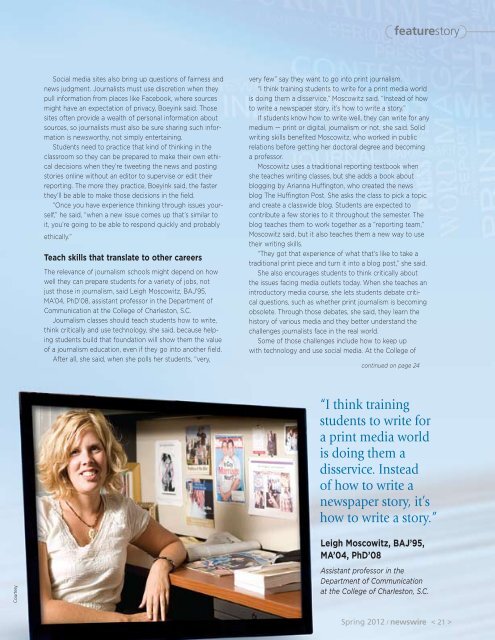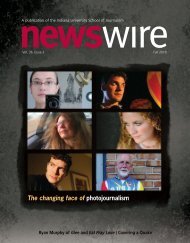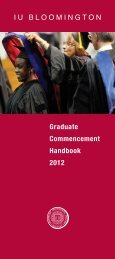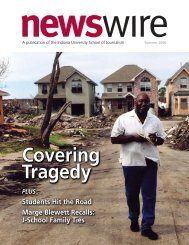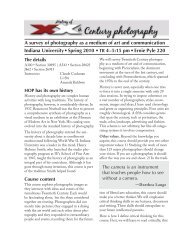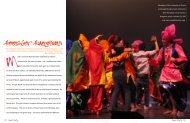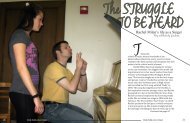Spring 2012 - Indiana University School of Journalism
Spring 2012 - Indiana University School of Journalism
Spring 2012 - Indiana University School of Journalism
Create successful ePaper yourself
Turn your PDF publications into a flip-book with our unique Google optimized e-Paper software.
featurestorySocial media sites also bring up questions <strong>of</strong> fairness andnews judgment. Journalists must use discretion when theypull information from places like Facebook, where sourcesmight have an expectation <strong>of</strong> privacy, Boeyink said. Thosesites <strong>of</strong>ten provide a wealth <strong>of</strong> personal information aboutsources, so journalists must also be sure sharing such informationis newsworthy, not simply entertaining.Students need to practice that kind <strong>of</strong> thinking in theclassroom so they can be prepared to make their own ethicaldecisions when they’re tweeting the news and postingstories online without an editor to supervise or edit theirreporting. The more they practice, Boeyink said, the fasterthey’ll be able to make those decisions in the field.“Once you have experience thinking through issues yourself,”he said, “when a new issue comes up that’s similar toit, you’re going to be able to respond quickly and probablyethically.”Teach skills that translate to other careersThe relevance <strong>of</strong> journalism schools might depend on howwell they can prepare students for a variety <strong>of</strong> jobs, notjust those in journalism, said Leigh Moscowitz, BAJ’95,MA’04, PhD’08, assistant pr<strong>of</strong>essor in the Department <strong>of</strong>Communication at the College <strong>of</strong> Charleston, S.C.<strong>Journalism</strong> classes should teach students how to write,think critically and use technology, she said, because helpingstudents build that foundation will show them the value<strong>of</strong> a journalism education, even if they go into another field.After all, she said, when she polls her students, “very,very few” say they want to go into print journalism.“I think training students to write for a print media worldis doing them a disservice,” Moscowitz said. “Instead <strong>of</strong> howto write a newspaper story, it’s how to write a story.”If students know how to write well, they can write for anymedium — print or digital, journalism or not, she said. Solidwriting skills benefited Moscowitz, who worked in publicrelations before getting her doctoral degree and becominga pr<strong>of</strong>essor.Moscowitz uses a traditional reporting textbook whenshe teaches writing classes, but she adds a book aboutblogging by Arianna Huffington, who created the newsblog The Huffington Post. She asks the class to pick a topicand create a classwide blog. Students are expected tocontribute a few stories to it throughout the semester. Theblog teaches them to work together as a “reporting team,”Moscowitz said, but it also teaches them a new way to usetheir writing skills.“They got that experience <strong>of</strong> what that’s like to take atraditional print piece and turn it into a blog post,” she said.She also encourages students to think critically aboutthe issues facing media outlets today. When she teaches anintroductory media course, she lets students debate criticalquestions, such as whether print journalism is becomingobsolete. Through those debates, she said, they learn thehistory <strong>of</strong> various media and they better understand thechallenges journalists face in the real world.Some <strong>of</strong> those challenges include how to keep upwith technology and use social media. At the College <strong>of</strong>continued on page 24“I think trainingstudents to write fora print media worldis doing them adisservice. Instead<strong>of</strong> how to write anewspaper story, it’show to write a story.”CourtesyLeigh Moscowitz, BAJ’95,MA’04, PhD’08Assistant pr<strong>of</strong>essor in theDepartment <strong>of</strong> Communicationat the College <strong>of</strong> Charleston, S.C.<strong>Spring</strong> <strong>2012</strong> / newswire < 21 >


